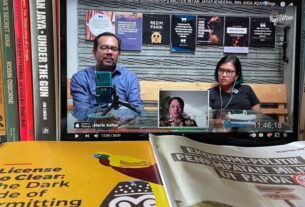SECRETARY BLINKEN: Thank you, everyone. Thank you, and good morning again. Thank you.
So I again want to thank President Yoon and Foreign Minister Cho for bringing us together to discuss what is one of the most transformational forces that’s shaping our future, our world, our democracies – and that is artificial intelligence.
I think it’s hard to overstate the extent to which the decisions that we make as governments, as communities, as people, as enterprises, over the coming months and coming years – it’s hard to overstate the impact that’s going to have on many years and many decades to come when it comes to AI. We have a profound stake in ensuring that democracies can lead the world in AI innovation – so that we can in turn lead the world in setting the norms, the standards, the rules by which artificial intelligence is used. That’s the most effective way, and the necessary way, to make sure that we’re reaping the technology’s extraordinary opportunities, but also protecting people from harm. And you heard Gabriela allude to some of this just a few moments ago.
We can see, we can feel the tremendous excitement about AI around the world, and in fact, nowhere more so than in the vast global majority countries. There’s a sense that this is a tool, a means by which to genuinely accelerate progress. And we’re already seeing some of that.
Kenya, for example, has deployed a new AI-enabled bot that enables women and girls to access comprehensive and accurate reproductive health information.
Chile developed “Creamos,” an AI-supported tool that encourages young people to contribute their ideas to foster social change and to advance sustainable development.
In Ukraine, an anti-corruption organization and tech companies came together on an AI-enabled system to accurately document attacks on cultural heritage and civilian infrastructure, which is strengthening Ukraine’s prosecution of war crimes.
We also know that AI has tremendous power to drive development that directly improves people’s lives – and in doing so, earn the confidence of our people, people around the world, in our democratic model.
But here’s the reality. Right now, the world is on track to achieve just 12 percent – just 12 percent – of the Sustainable Development Goals by 2030. So we are way behind. But AI could accelerate progress on 80 percent of the goals – from improving agricultural productivity to combatting hunger, to detecting and preventing outbreaks of disease, to accelerating our clean energy transition that creates jobs and protects our planet at the same time.
And as I’m traveling around the world, at least, what I’m hearing again and again and again is optimism about the potential for AI. Democracies are positioned to harness that optimism.
But AI is also a critical arena in which democracy is being challenged.
So while we seek to harness the power of AI and other digital technologies for good, some governments are abusing those same technologies to do just the opposite.
They’re using AI tools, like facial recognition and bots, to surveil their own citizens. Harass journalists, human rights defenders, and political dissidents. Spread mis- and disinformation that undermines free and fair elections, or sets one segment of our societies against another.
Our democracies are hardly immune to the harms from AI misuse and failure, including impacts from the choices that tech companies make in deploying their innovations – from our citizens being able to access fewer and less diverse media sources because of the failures of AI-enabled search engines, to discrimination and bias that disproportionately affect racial and ethnic minorities.
The United States is determined to shape the terms of our technological future in a way that’s inclusive, rights-respecting, that sustains democratic values and democratic institutions. We’ve made historic investments in our technological capabilities and those of our democratic partners.
At the same time, we’re pairing those investments with efforts to lead on the governance of artificial intelligence. Those include an executive order strengthening AI safety and security, privacy protections, and equity and civil rights, while promoting innovation. We’ve also set out an AI Risk Management Framework, a Blueprint for an AI Bill of Rights, a new AI Safety Institute, voluntary commitments endorsed by 15 top tech companies, and an international code of conduct for organizations developing advanced AI systems.
We’re building broad and inclusive support to uphold safe, secure, and trustworthy AI. Just this week, the United Nations is set to adopt the first-ever standalone resolution on AI – focused on ensuring that AI is deployed to advance sustainable development and actually deliver progress in people’s lives. This resolution is led by the United States; it’s now co-sponsored by more than 75 countries. And to those who have not yet joined, we really invite you to do so.
This unity reflects a strong global consensus in support of two equally important goals: that AI is safe, secure, and trustworthy, and that its benefits are actually shared by all. We must support governance and capacity building that narrows the digital divide.
AI is just one component of our broader democratic approach to technology.
We’re countering government surveillance and the misuse of spyware.
Last year, President Biden issued an executive order prohibiting the use of commercial spyware by the United States Government when its use poses security risks to our country – or where it could lead to misuse by a foreign actor, including to carry out human rights abuse or to suppress civil liberties.
Six countries just signed on to our joint statement on the proliferation and misuse of commercial spyware. They join a 17-member-strong coalition that’s collaborating to make sure that spyware is used consistent with respect for universal human rights and for basic freedoms.
We’re defending human rights defenders online. Today, we’re releasing first-of-its-kind guidance to give technology companies the tools to help prevent, mitigate, and seek justice for attacks on human rights defenders online.
We’re protecting access to a free and open internet. Since 2023, the U.S. Government has supported 30 million users of circumvention tools, like VPNs, to get around government internet blackouts each month through the Surge and Sustain Fund for Anti-Censorship Technology.
The stakes of this work could not be greater. But again, seeing everyone here today, seeing the work that we’ll be doing over the next three days, the information we’ll be sharing, the best practices we’ll be working on together, that, again, gives me confidence that this is a challenge that we can not only embrace, but that we can succeed in meeting. If we can harness all of the extraordinary potential, all the extraordinary good in AI, while mitigating the downsides, we will – we will – advance progress for people in all of our countries and around the world.
It’s a tremendous responsibility, but we have to meet it in this moment. Because again – I’ll close with this – this is moving so fast, it’s moving so quickly, that what is decided now and in the weeks and months ahead is going to shape the future for generations to come. So there’s urgency to this effort, and we’ll be much more effective, much stronger, when we work together.
Thank you. (Applause.)



